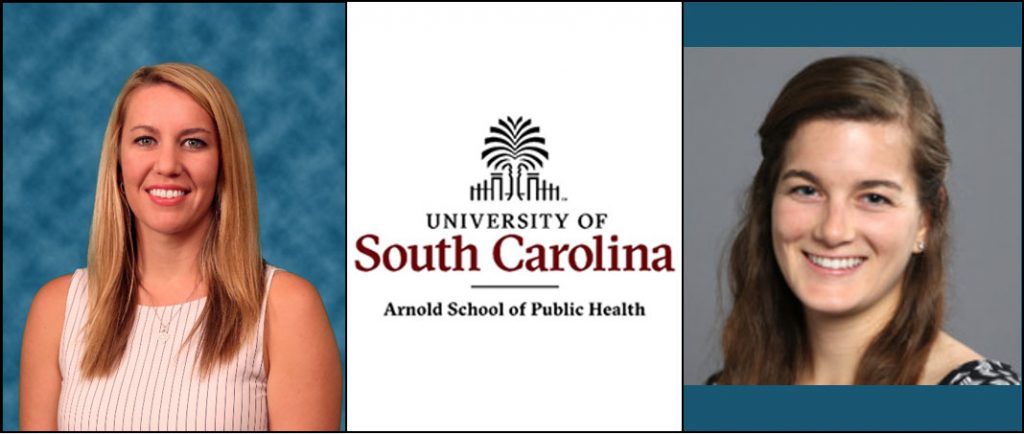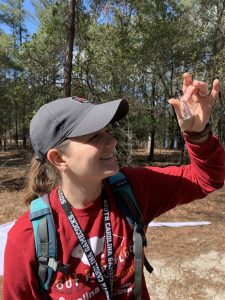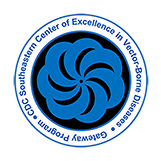Meet The Team
Melissa Nolan, PhD, MPH and Kyndall Braumuller, MS
Arnold School of Public Health, University of South Carolina

Melissa Nolan, PhD, MPH is an Assistant Professor in Epidemiology and Biostatistics at the Arnold School of Public Health, University of South Carolina (USC). Dr. Nolan is a first-generation college student, whose parents fostered a learning environment that encouraged her to pursue a college degree. While earning her Bachelors of Science degree from University of Georgia, Dr. Nolan took a medical entomology course that inspired her passion for research. Her initial focus was to attend medical school but after an international experience she became interested in public health. Dr. Nolan then attended the University of Texas School of Public Health (UTSPH) and received a Masters of Public Health with an Epidemiology and Global Health Concentration. After her MPH she worked as a clinical research coordinator at the UTSPH Center for Infectious Diseases exploring her interests in clinical research which led to her pursuing a PhD in Clinical Investigation at Baylor College of Medicine. After her PhD Dr. Nolan continued research at Harris Health Hospital System and worked as an instructor at the Baylor College of Medicine, National School of Tropical Medicine, before beginning her appointment at USC.
Dr. Nolan’s lab at USC emphasizes her diverse background as she explores a variety of public health concerns including enzootic and vector-borne diseases. In the lab, Dr. Nolan emphasizes the importance of peer-to-peer mentorship developing a team environment for her students and giving PhD students the opportunity to develop their skills as mentors. Her lab focuses on applied research that has effects for public health, and believes strongly in collaboration with state entomologists, universities, local public health agencies, and relaying the research of her lab back to the people and the public health her research can inform.
 Dr. Nolan’s PhD student Kyndall Braumuller, is a former SECVBD intern whose background inspired her to pursue a degree studying vector-borne diseases. Even as a young child Kyndall was interested in entomology. While attending the University of Georgia (UGA) Kyndall took an entomology course, which also inspired her interest in medical entomology similarly to Dr. Nolan. Kyndall completed two bachelors degrees at UGA one in Entomology and the other in Environmental Health Science. With her interest in research and medical entomology Kyndall went on to complete a Masters degree in Medical Entomology at the University of Kentucky. After her masters, Kyndall worked for a local health department in mosquito and vector control for three years where she met Dr. Nolan. In the summer of 2019, Kyndall worked as a SECVBD intern with Dr. Nolan which led to Kyndall beginning her PhD work. Kyndall is now pursuing her PhD at USC in Epidemiology.
Dr. Nolan’s PhD student Kyndall Braumuller, is a former SECVBD intern whose background inspired her to pursue a degree studying vector-borne diseases. Even as a young child Kyndall was interested in entomology. While attending the University of Georgia (UGA) Kyndall took an entomology course, which also inspired her interest in medical entomology similarly to Dr. Nolan. Kyndall completed two bachelors degrees at UGA one in Entomology and the other in Environmental Health Science. With her interest in research and medical entomology Kyndall went on to complete a Masters degree in Medical Entomology at the University of Kentucky. After her masters, Kyndall worked for a local health department in mosquito and vector control for three years where she met Dr. Nolan. In the summer of 2019, Kyndall worked as a SECVBD intern with Dr. Nolan which led to Kyndall beginning her PhD work. Kyndall is now pursuing her PhD at USC in Epidemiology.
Dr. Nolan has several active research projects in vector-borne diseases including ticks, mosquitoes, and kissing bugs. They are studying La Crosse encephalitis, a mosquito transmitted virus, at the border of North Carolina and South Carolina, identifying the foci and analyzing any patterns. Dr. Nolan also works with Dr. Matt DeGennaro an SECVBD PI at Florida International University to better understand Aedes aegypti and Aedes albopictus habitat use in industrial areas such as Charleston, SC and comparing that to the dynamics in Miami, FL. For ticks, South Carolina is an area where the blacklegged ticks, Ixodes scapularis, are becoming more common. Dr. Nolan’s lab is focusing on statewide surveillance of ticks to aid state entomologists and better understand the risk of tick-borne diseases in SC.
Dr. Nolan’s lab also studies Chagas disease and studies kissing bugs in SC as well as areas in the Southwestern US and El Salvadore. There is evidence of a mite controlling kissing bugs aka triatomines in the southwestern US and may be a biological control option. In El Salvador, Dr. Nolan and collaborators are studying a pediatric cohort of Chagas cases. Learn more about the South Carolina results here: Domestic Triatoma sanguisuga–Human Exposure in the South Carolina Coastal Region.With her research partner Dr. Gabriel Laporta, they are studying coinfections of malaria and Chagas to see how this may affect the immune system, as well as long-term outcomes. Read their latest article here: Oral Trypanosoma cruzi Transmission Resulting in Advanced Chagasic Cardiomyopathy in an 11-Month-Old Male
Kyndall’s dissertation research focuses on the tick-surveillance project. Although surveillance of ticks has been done several years ago in a small number of SC counties, there has not been a recent study to look at which ticks are currently present in SC and what the pathogen prevalence is or determine state-wide prevalence. Kyndall’s goal is to better understand the distribution of the ticks and pathogens they carry, and connect this back to human health and clinical research. By focusing on both ticks and human cases she will gain a better insight into the system. Kyndall has also been working with an intern in the Nolan lab to collect ticks from veterinarians and animal shelters; this form of passive surveillance will add the final element to get a One Health understanding of ticks in SC. Also passive surveillance such as this can be a useful indicator of presence if new ticks such as the invading Asian longhorn tick were to appear.
Kyndall is often recognized for her “bug knowledge” and important research she is doing. Kyndall received the Outstanding Student Award at the Mid-Atlantic Mosquito Control Association in 2020 and also received the Norman J. Arnold School of Public Health Fellowship Award at USC. Kyndall has even given guest lectures to graduate and undergraduate courses at USC to spread awareness about medical entomology.
Beyond vector-borne diseases Dr. Nolan also studies other areas of public health concern including being a part of the task force at USC for the COVID-19 pandemic. Learn more about the novel coronavirus from Dr. Nolan here:
🦠 We recently caught up with @USCArnoldSchool assistant professor of #epidemiology & biostatistics, Dr. Melissa Nolan, to learn more about the novel #coronavirus. ⬇️ pic.twitter.com/SPxUsH1Oa8
— University of South Carolina (@UofSC) March 16, 2020
To learn more about Dr. Nolan and Kyndall see the links below:
APHIDS (Association of Public Health Infectious Disease Society) at UofSC Instagram


